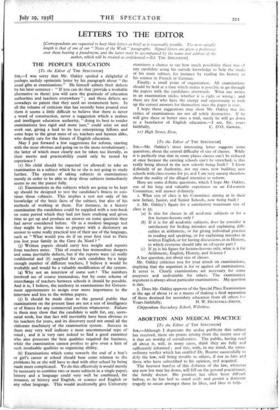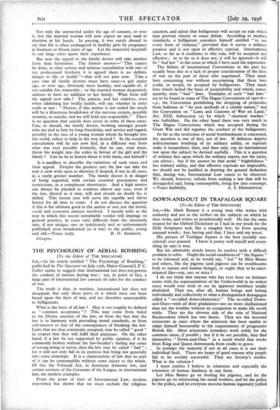ABORTION AND MEDICAL PRACTICE [To the Editor of THE SPECTATOR]
SIR,—Although I deprecate the undue publicity this subject has received, there are points arising from- the recent case of it that are worthy of consideration. The public, having read all about it, will, in many cases, think they are fully and' sufficiently informed ; and this, with, to my mind, the extra- ordinary verdict which has enabled Dr. Bourne successfully to defy the law, will bring trouble to others, if not to him and those who have subscribed to his opinion, and acquittal.
The heaviest burden of this defiance of the law, whatever any new law may lay down, will fall on the general practitioner, the family doctor. His position has often been difficult before, as he has had- to stand aside and permit a domestic tragedy to Not only the unmarried under the age of consent, or over it, but the married woman will now expect an easy road to abortion at his hands. In passing, it was surely absurd to say that life is often endangered in healthy girls by pregnancy at fourteen or fifteen years of age. Let the maternity hospitals in our large cities quote their experience. But now the appeal to the family doctor will take another form than heretofore. The former answer—" This cannot be done, as after serious and anxious consultation with two of my professional brethren it is agreed there is no definite danger to life or health "—that will not pass now. Take a case that all family doctors must have seen—a girl under age, or over age, obviously most healthy, and capable of, if not suitable for, maternity; or the married woman desperately anxious to have no addition to her family. What form will the appeal now take ? The patient, and her relatives, even when admitting her bodily health, will say, whether in strict truth or not : " Doctor, if this matter is not ended the result will be a disastrous breakdown of the nervous system, possibly insanity, or suicide, and we will hold you responsible." There is no question that suicide does occur in some of these gases. Can, or should, the family doctor, working amongst people who are tied to him by.long friendship, and service and 't egard, possibly in the case of a young woman whom he brought into the world, refuse to help in the way desired ? In the essential consultation will he not now feel, in a different way from what was ever possible formerly, that he can, even must, throw his weight into the scales in favour of the girl and the family ? Can he be as honest about it with them, and himself ? It is needless to describe the variations of such cases, and their appeal. Despite the greatest care the law can take the way is now wide open to abortion if desired, if not in all cases, in a vastly greater number. The family doctor is in danger of being regarded, with certain essential precautions and restrictions, as a complacent abortionist. And a high motive can always be pleaded to condone almost any case, even if the law, altered as it may, will and should no doubt be, is defied. This recent case will serve the capable and clever lawyer for all time to come. I do not discuss the question if this is for ultimate good to the nation or not, nor the moral, social and economic matters involved. I merely refer to the way in which this recent remarkable verdict will impinge on general practice, in cases very different from the extremely rare, if not unique, one so indelicately and so unfortunately published, even broadcasted (as it was) to the public, young



































 Previous page
Previous page